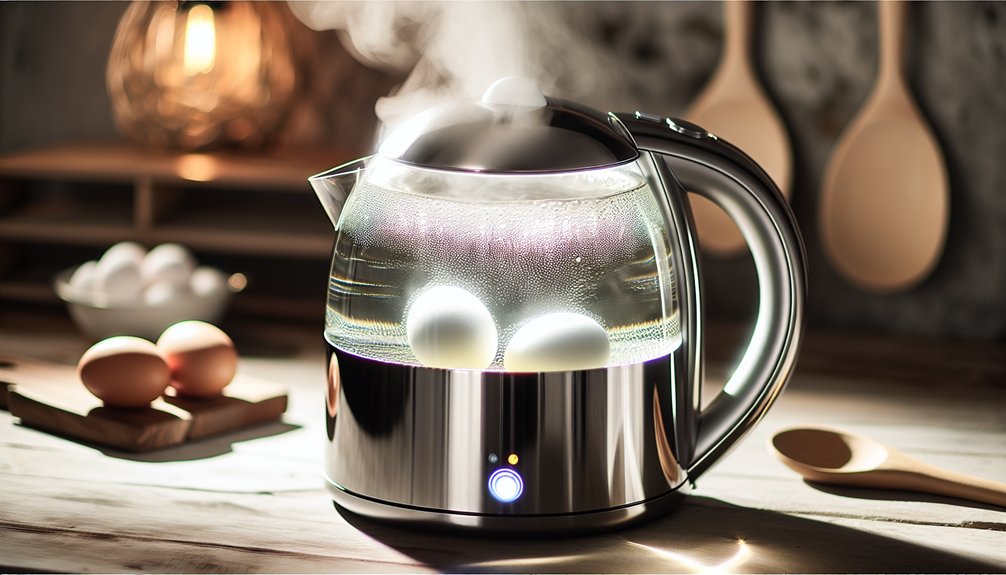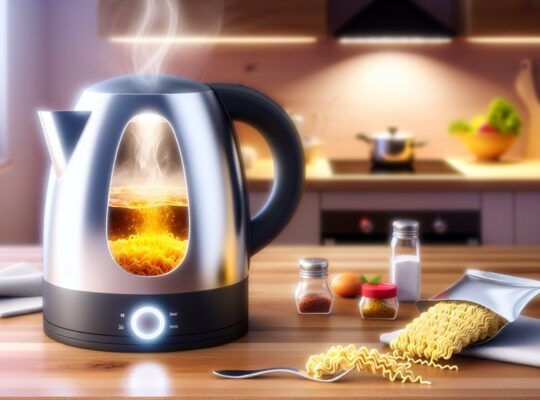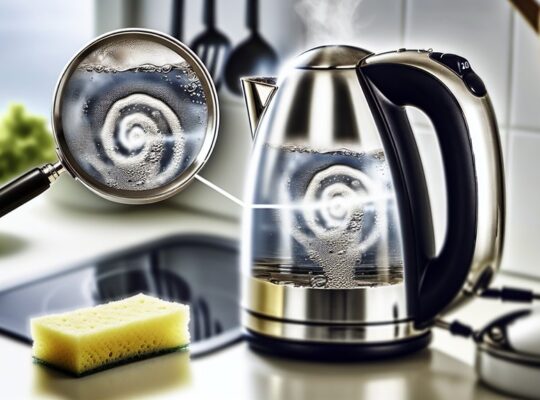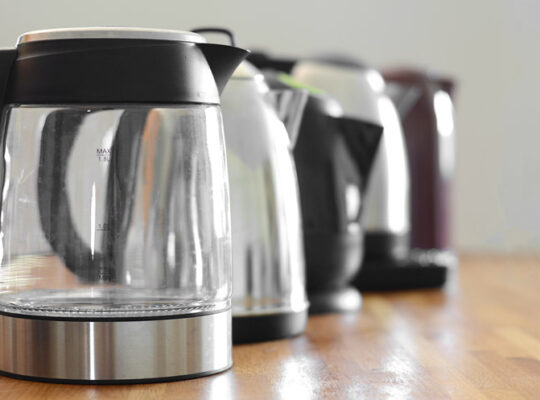To boil eggs in an electric kettle, cook large eggs for 6-7 minutes if you want soft-boiled and 10-12 minutes for hard-boiled. For medium eggs, soft-boiled usually takes about 5 minutes. Adjust the timing based on your egg size and desired doneness. Make sure to cover the eggs completely with water in the kettle. Keep these tips in mind to achieve the perfect results, and there’s more you’ll want to know to enhance your egg-cooking skills.
Key Takeaways
- For soft-boiled large eggs, cook for 6-7 minutes in an electric kettle.
- Hard-boiled large eggs require 10-12 minutes of boiling time.
- Medium eggs typically need about 5 minutes for soft-boiling.
- Always ensure eggs are fully submerged in water for even cooking.
- Adjust cooking time based on egg size and desired doneness for best results.
Understanding Cooking Times for Different Egg Types
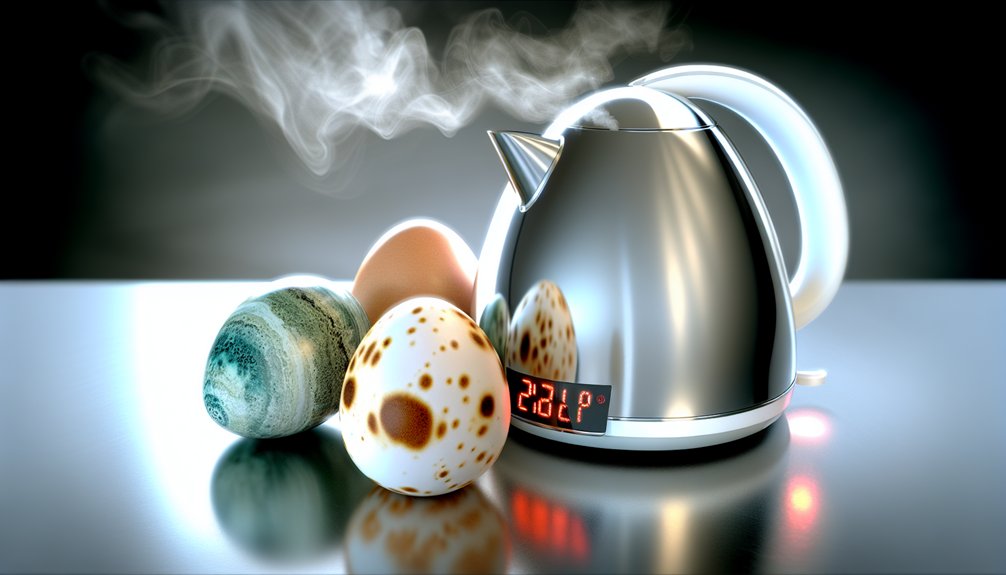
When you’re boiling eggs, it’s essential to understand that different types of eggs require varying cooking times to achieve your desired doneness. The most common egg varieties include large, medium, and extra-large eggs, each needing specific attention. For large eggs, a soft-boiled texture typically takes about six minutes, while medium eggs may need around five minutes. If you prefer hard-boiled, aim for 9-12 minutes for large ones. Cooking methods also play a role; for instance, using an electric kettle can provide more consistent heating than traditional stovetop methods. Always remember to adjust your timing based on the size and type of egg you’re using to guarantee the perfect result every time.
Step-by-Step Guide to Boiling Eggs in an Electric Kettle
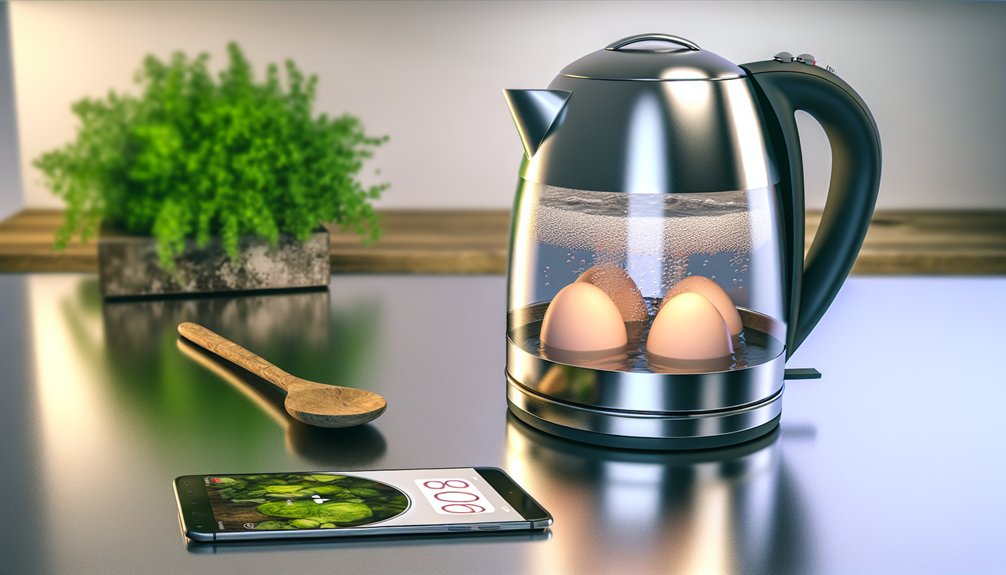
To boil eggs in an electric kettle effectively, you’ll want to follow a straightforward process that guarantees ideal results. Start by placing your eggs in the kettle, ensuring they’re not crowded. Next, fill the kettle with enough water to cover the eggs completely. Turn on the kettle and allow the water to reach a rolling boil. Once boiling, you’ll need to adjust the timing based on your desired egg doneness: around 6-7 minutes for soft-boiled and 10-12 minutes for hard-boiled. After the timer goes off, carefully remove the eggs and place them in an ice bath to stop the cooking process. This method of egg boiling in an electric kettle is efficient and yields delicious results every time.
Tips for Achieving Perfectly Cooked Eggs
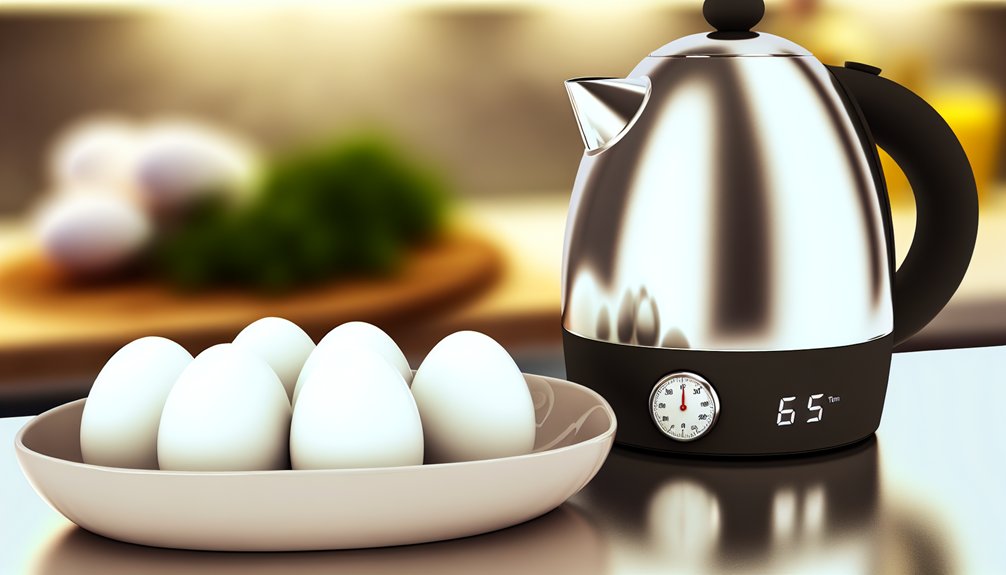
Achieving perfectly cooked eggs involves attention to detail and a few key techniques. First, consider egg freshness; fresher eggs tend to have firmer whites, which can improve the overall texture. Always check the expiration date and opt for eggs that have been stored correctly. Next, focus on temperature control. Start with room temperature eggs to guarantee even cooking; if they’re cold, they may crack when placed in hot water. Additionally, adjust your boiling time based on your desired doneness—soft-boiled typically takes 6-7 minutes, while hard-boiled requires about 9-12 minutes. Using an electric kettle can simplify this process and ensure rapid boiling. Finally, immediately transfer cooked eggs to an ice bath to stop the cooking process and maintain the perfect texture. Implementing these tips will elevate your egg boiling skills.
Troubleshooting Common Issues
While boiling eggs in an electric kettle can be straightforward, several common issues may arise that can affect the outcome. One key factor is egg freshness; older eggs may crack during boiling, leading to a messy result. To avoid this, always check the sell-by date and opt for fresher eggs.
Kettle maintenance is essential as well. If your kettle has mineral buildup, it can impact heating efficiency, resulting in unevenly cooked eggs. Regularly descaling your kettle with vinegar or a descaling solution will help maintain peak performance. Additionally, using a kettle designed specifically for boiling eggs, such as the KENT 16069 Super Egg Boiler, can enhance your cooking experience and yield better results.
If you notice your kettle overheating or shutting off prematurely, verify it’s not overfilled and that the lid closes properly. Address these issues, and you’ll enjoy perfectly boiled eggs every time.
Creative Ways to Use Boiled Eggs in Meals
Once you’ve mastered the art of boiling eggs in your electric kettle, you might wonder how to incorporate them into your meals. Here are three creative ways to enjoy your boiled eggs:
- Egg Salad: Chop the boiled eggs and mix them with mayonnaise, mustard, and your choice of herbs. Serve it on bread or crackers for a quick snack or lunch.
- Breakfast Burritos: Dice the boiled eggs and wrap them in a tortilla with cheese, veggies, and salsa. It’s a filling, protein-packed breakfast that’s easy to customize.
- Salads: Slice boiled eggs and toss them into salads for added protein and creaminess. They pair well with greens, tomatoes, and your favorite dressing.
These options can elevate your meals with minimal effort!
Frequently Asked Questions
Can I Boil Eggs Without Water in an Electric Kettle?
You can’t boil eggs without water in an electric kettle. Traditional boiling methods require water for heat transfer. If you’re considering alternatives, try steaming or using an egg cooker designed for these tasks.
What Type of Electric Kettle Is Best for Boiling Eggs?
For boiling eggs, choose stainless steel kettles with precise temperature control. They guarantee even heating, reduce the risk of cracking, and provide durability. You’ll appreciate the consistent results and efficiency in your egg-cooking process.
How Do I Clean My Kettle After Boiling Eggs?
To clean your kettle after boiling eggs, focus on egg residue removal. Use a vinegar-water solution for effective cleaning. Regular maintenance helps prevent buildup; follow these kettle maintenance tips for prolonged efficiency and hygiene.
Can I Use Frozen Eggs in an Electric Kettle?
You can use frozen eggs in an electric kettle, but make sure they’re thawed first. Cooking directly from frozen could lead to uneven heating and potential safety risks, so thawing is crucial for best results.
Are There Safety Concerns When Boiling Eggs in an Electric Kettle?
When boiling eggs in an electric kettle, you should consider safety precautions. Electric kettle risks include potential burns, overheating, or egg explosion. Always monitor the process and guarantee the kettle’s safety features are functioning correctly.
Conclusion
To summarize, boiling eggs in an electric kettle is a straightforward process that varies based on your desired doneness. Generally, it takes about 6-12 minutes, depending on whether you prefer soft or hard-boiled eggs. By following the outlined steps and tips, you can achieve consistently perfect results. If you encounter any issues, troubleshooting is simple. With these methods, you can enjoy delicious boiled eggs, enhancing your meals with their nutritional benefits and versatility.
